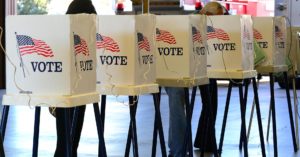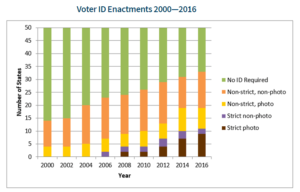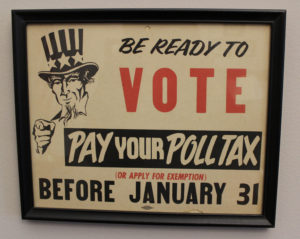USA: Voto y Leyes Electorales

Imagen: https://fm.cnbc.com/applications/cnbc.com/resources/img/editorial/2014/10/30/102138891-155682075.1910×1000.jpg
Leyes electorales y Enmiendas Constitucionales
Las leyes que regulan las elecciones en los Estados Unidos datan del Artículo 1 de la Constitución, la cual asigna a los estados la rfesponsabilidad de supervisar las elecciones federales. Varias enmiendas constitucionales y leyes federales han sido aprobadas hace muchos años para asegurar que todos los Americanos gocen del derecho al voto y la capacidad de ejercer este derecho.
Enmiendas Constitucionales
La Decimoquinta Enmienda de la Constitución otorgó a los varones Afroamericanos el derecho al voto. Sin embargo, muchos de ellos no fueron capaces de ejercerlo por casi 100 años. Los impuestos por capitación, pruebas de conocimientos y otros medios utilizados por los Estados del Sur hicieron difícil el ejercicio del derecho al voto para ellos.
La Decimonovena Enmienda de la Constitución, retificada en 1920, dipuso el derecho al voto para las mujeres Americanas.
La Vigésimocuarta Enmienda de la Constitución, ratificada en 1964, eliminó el impuesto por capitación, el cual afectó desproporcionadamente a los Afroamericanos como barrera a su derecho al voto en las elecciones federales.
La Vigesimosexta Enmienda de la Constitución, ratificada en 1971, rebajó la edad para votar a 18 años de edad.
Leyes Federales para el Derecho al Voto
Varias leyes federales aprobadas a lo largo de los años ayudan a proteger el derecho al voto de los Americanos, facilitándoles el ejercicio del mismo.
La Ley sobre Derechos Civiles provee las primeras protecciones legales contra la discriminación en el voto (42 U.S.C. 1971 & 1974). Estas protecciones se originaron en la Ley sobre Derechos Civiles de 1870, y fueron enmendadas posteriormente por la Ley de Derechos Civiles de 1957, 1960 y 1964.
La Ley de Derecho al Voto de 1965. Esta Ley prohibe prácticas y procedimientos electorales que realizan una discriminación basada en raza, color, o pertenencia a un grupo linguistico minoritario. También requiere que ciertas jurisdicciones provean materiales electorales en otros idiomas que no sean el inglés.
La Ley de Acceso al Voto para Personas Mayores y Personas con Discapacidades (VAEHA) de 1984. En general esta Ley requiere que los locales electorales sean accesibles a las personas con discapacidades.
Ley para la Votación de los Ciudadanos en la Fuerzas Armadas y en el Extranjero (UOCAVA) de 1986. Esta norma permite a los miembros de las Fuerzas Armadas ciudadanos fuera del país registrarse para votar y votar por correo.
Ley Nacional del Registro de Votantes (HAVA) de 1993. Esta ley autoriza fondos federales para la administración electoral y crea la Comisión de Asistencia Electoral de los Estados Unidos (EAC). También requiere que los Estados adopten normas mínimas en sistemas de votación, boletas provisionales, carteles de información para votantes en los días de las elecciones y para los votantes que por primera vez que se registren para votar por correo y bases de datos estatales de registro de votantes. La EAC apoya a los Estados en el cumplimiento de estos requisitos.
Ley de Empoderamiento del Voto Militar y en el Extrajero (MOVE) de 2009. Esta Ley mejora la Ley para la Votación de los Ciudadanos en la Fuerzas Armadas y en el Extranjero (UOCAVA) en cuanto al acceso al acceso al voto de estos. Requiere que los Estados les faciliten el acceso electrónico en varias etapas del proceso electoral, el envío de boletas de votación por correspondencia para ciertos votantes 45 días antes de la elección por lo menos, y desarrollar el sistema de libre acceso para informar a los militares y ciudadanos en el extranjero sobre la confirmación de su voto o si las boletas han sido recibidas y contadas.
Leyes Sobre el Documento de Identidad (ID) de los Votantes
Dos tercios de los Estados requieren que el ciudadano muestre alguna forma de identificación antes de permitírsele votar en las urnas.
Las leyes de su Estado, como se indica en el mapa, determinaran si el votante tendrá que mostrar una identificación, y si es así, de qué tipo.

Imagen y mayores detalles del cuadro en: http://www.ncsl.org/research/elections-and-campaigns/voter-id.aspx#Laws%20in%20Effect
Identificación con Foto frente a Identificación sin Foto
Aproximadamente la mitad de los Estados con leyes de identificación de votantes aceptan sólo identificaciones con foto, como licencias de conducir, tarjetas de identificación emitidas por el estado, tarjetas de identificación militar y pasaportes. Muchos de estos estados ahora ofrecen una tarjeta de identificación de votante gratis en caso el votante no tenga otra forma de identificación con foto válida.
Otros estados aceptan ciertos tipos de identificaciones sin fotografía, como certificados de nacimiento, tarjetas de Seguro Social, estados de cuenta bancarios y facturas de servicios públicos (agua, electricidad, gas, etc). Cada Estado es específico respecto de los documentos que aceptará como prueba de identificación. El votante debe asegurarse de conocer los requisitos de su Estado para votar antes del Día de las Elecciones.
También debe ser consciente de que ciertas objeciones legales pueden afectar las leyes de identificación de votantes de algunos estados, y los requisitos pueden cambiar como resultado de ello. Siempre es aconsejable verificar directamente con la oficina electoral del Estado para asegurarse de que tiene la identificación adecuada.

Imagen y mayores detalles en: http://www.ncsl.org/research/elections-and-campaigns/voter-id-history.aspx
Procedimientos para votar sin ID
Incluso si el votante no tiene una forma de identificación que su Estado requiere, se le puede permitir votar. Sin embargo, algunos Estados requieren que tome medidas adicionales después de votar para asegurarse de que su voto cuenta.
Algunos Estados pueden requerir que firme un formulario que confirme su identidad. Otros Estados permitirán al votante emitir una boleta provisional, que se usa cuando hay una pregunta con respecto a la elegibilidad de un votante. En algunos estados, los funcionarios electorales investigarán la elegibilidad del votante y decidirán si contarán el voto.
Otros estados requieren que regrese a la oficina electoral dentro de unos días y muestre una forma aceptable de identificación. Si no lo hace, su voto no se contará.
Nombre o dirección no coincidente
Incluso si el votante tiene una forma de identificación que su Estado acepta, se le puede requerir que emita una boleta provisional si el nombre o la dirección en su identificación no coincide con el nombre o la dirección en su registro de votante. Esto puede suceder, por ejemplo, si:
- El votante se casó, cambió su apellido, actualizó su registro de votante pero presentó una licencia de conducir con su nombre no casado.
- El votante se mudó, presentó una factura de servicios públicos actual como prueba de identificación, pero se olvidó de actualizar su dirección en su registro de votante de antemano.
Además, algunos estados requieren que el votante notifique a su oficina de registro local de cualquier cambio en su nombre para seguir siendo un votante registrado calificado.
Los votantes pueden evitar problemas siempre actualizando su registro de votante cada vez que se muda o si cambia su nombre.
Votantes por primera vez
Los votantes primerizos que no se registraron en persona y no han proporcionado previamente prueba de identificación son requeridos por la ley federal a mostrar alguna forma de identificación.


